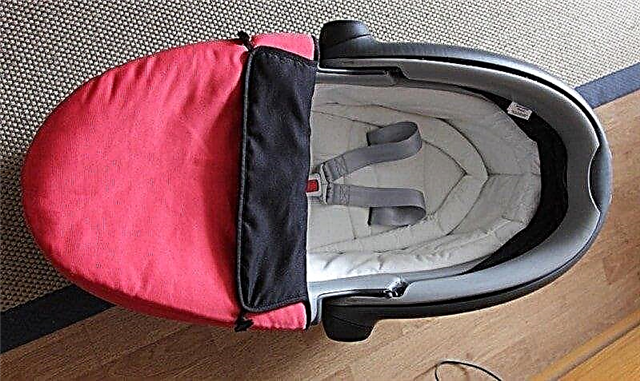Due to infancy, an infant cannot complain about his health, tell that he has a sore throat. That is why it is very difficult to guess that the baby is worried about unpleasant symptoms. The article will discuss how to understand that a baby has a sore throat, what are the possible reasons, how to check a baby's throat and help a baby, what can be done to prevent painful symptoms?

Sore throat in newborns is a fairly common phenomenon
Signs of sore throat
On the one hand, a baby cannot tell others about his problem, but on the other, he will try in every possible way (even if unconsciously) to convey this information to adults. In response to the negative processes occurring in the newborn's body, the baby's behavior changes: the baby becomes restless (or vice versa lethargic), sleeps poorly, refuses to eat. As a result, the regime of the day (if it was set earlier) is violated.
So, the main signs by which you can determine a sore throat in an infant are:
- Episodic sleep. The child falls asleep for only 30-40 minutes, and then wakes up and starts crying. At the other extreme, sleeping too long, which can also indicate health problems;
- Refusal to eat if the inflammation is so severe that the baby cannot swallow normally. Obviously, the unsatisfied feeling of hunger will only intensify, and the baby will begin to cry and be capricious;
On a note. In such cases, the baby greedily takes the bottle or breast, but after a few seconds, throws it down and starts screaming. It becomes almost impossible to feed the baby.
- Tears, screams and whims will appear not only during the feeding process, but also during the rest of the time, as the baby must swallow saliva. In the presence of inflammation, this is very difficult to do, and the baby, in pain, will definitely start crying;
- Increased salivation, which is explained by the following reason: saliva is a natural antiseptic, which is intensively produced by the body during inflammation in order to destroy pathogenic bacteria and viruses that have entered the oropharynx;
Worth knowing! Increased production of saliva is not the defining symptom of throat disease. A similar symptom often occurs in babies under the age of 4 months before the first tooth appears (even if the last one appeared at 7-8 months).
- In some cases, a runny nose precedes the throat problem. The fact is that during the period of nasal congestion, the baby constantly breathes with his mouth, as a result, the mucous surface of the larynx and almonds dry up and become inflamed;
- A predisposing factor in the development of the disease is the low immunity of the child. In addition, the appearance of pathology is facilitated by the friability of the mucous membranes (typical for newborn babies). Once on such a surface, pathogens multiply more actively, provoking inflammation;
- During the illness, the child feels general malaise, weakness, he has a fever (however, most often the temperature rises slightly and not in all cases), cough, runny nose. At the same time, the last signs do not always help to establish the problem, since they are weakly manifested (the baby does not know how to cough and blow his nose).
Important! This feature aggravates the situation - mucus accumulates in the baby's nasopharynx, which serves as a breeding ground for bacteria. Therefore, the likelihood of developing otitis media, bronchitis and even pneumonia is high.
- Possible nausea, vomiting, profuse regurgitation;
- As a result of impaired appetite, fever, frequent regurgitation and vomiting, the baby begins to dehydrate, which aggravates the general condition of the child.

Symptoms of a cold in a baby
How to properly examine your throat
Noticing negative signs that may indicate problems with a baby's throat, many parents wonder how to properly look at the baby's throat. Thanks to this procedure, mom or dad will be able to make sure of the presence or absence of pain in the throat as a cause of anxiety for the baby. That is why parents should be well versed in this issue.
The procedure must be carried out carefully, after washing your hands and using a medical spatula or a clean teaspoon for examination. During the examination, you should not press hard on the root of the tongue, otherwise the gag reflex will work in the baby. It is recommended to lightly press the central part or tip of the tongue, while the child's head should be tilted back a little.
On a note. It is best to use a flashlight to simplify the inspection procedure and ensure the reliability of the result.
During the inspection, an assessment is made:
- General view of the mouth and throat;
- The shade of the mucous surfaces and the back wall of the larynx (in a healthy baby, blood vessels and redness should not be visible);
- The color and size of the tonsils;
- Puffiness and redness (confirm or exclude their presence);
- The presence or absence of white plaque on the tongue (a similar symptom is the norm for children on a milk diet).
In a normal state, the mouth and throat of a newborn should be pink, unsaturated. Swelling is allowed only if teething is expected in the near future. In a healthy baby, the tonsils should not be enlarged, their normal color is pink.

Throat examination in infants
Important! If the cause of the baby's restless behavior is a sore throat, the mother will be able to see redness of the mucous surfaces, enlarged tonsils, white coating on the tongue, cheeks, palate and back wall of the larynx. It is also possible the presence of ulcers, edema, caseous plugs.
In addition to examining the throat itself, it is necessary to check the lymph nodes for enlargement.
If the symptoms listed above were not found, but the baby's restless behavior, sleep and appetite disturbances are still present, then you need to contact the pediatrician. The doctor will help establish the true cause of negative changes in the child's condition. If the throat is really sore, it is recommended to call a doctor at home.
Important! Timely medical assistance cannot be neglected. Otherwise, neglected infections can lead to chronic ENT diseases, complications and various disorders in the work of internal organs (in particular, respiratory), which will be very difficult to cure. If the baby has wheezing, you need to call an ambulance.
Possible causes of sore throat
The most common cause of inflammation in the throat is the penetration of viruses into the body that provoke respiratory diseases. Infection most often occurs by airborne droplets while in public places with a large number of people (this can be clinics, public transport, shops).
A factor that makes it easier for pathogens to enter the nasopharynx is the constant habit of all babies to taste various objects. This desire intensifies during teething. A huge number of pathogenic bacteria and viruses live on the surface of toys or other objects that the baby drags into his mouth. The greatest danger are staphylococci and streptococci, which can cause angina. In addition to viral and bacterial infection, a fungal infection may enter the oropharynx. This most often occurs through contact with the vehicle or food and water.
Another reason a newborn may have a sore throat is an allergic reaction. Household chemicals (washing powder, dishwashing detergents) are often an allergen. Another factor that can cause inflammation and sore throat is too dry and hot air in the room where the patient is.
On a note. Colds most often occur against the background of hypothermia, since it reduces the protective functions of the body and thereby facilitates the entry of viruses and bacteria into the child's respiratory tract.
A cold in a newborn is a rather rare occurrence, since in the first few months the baby is protected by the antibodies received from the mother while in the womb. Breastfeeding also contributes to an increase in the protective functions of the body. During the first six months of life, there is a gradual decrease in the supply of antibodies, while the baby's own immunity has not yet developed. That is why a cold in a baby is still likely.
A sore throat in a child can cause a foreign body to get stuck in the oropharynx, such as food particles (seeds, seeds, etc.).

Signs of throat disease in infants
How can parents help a baby
If a child has a sore throat, parents can provide first aid. However, only a doctor should deal with the direct treatment of a baby under one year old. In addition, a specialist will be able to establish the exact cause of the disease and prescribe adequate therapy.
If there is no need to go to the hospital, and the doctor has allowed the baby to be treated at home, the first thing to provide to the patient is proper care. The air in the room should be humid and fresh. The baby should be given plenty of fluids.
On a note. If the baby refuses to drink water from the bottle, it is recommended to carefully pour it with a spoon. In addition to water, you can give rosehip broth or unsweetened dried fruit compote. It is best to offer liquid between feedings.
The child's nose must be cleaned with saline to prevent the mucous membranes from drying out. One teaspoon per liter of liquid is enough. You need to dress your baby so that he does not overheat or freeze.
Breastfeeding will be very helpful during colds, since breast milk contains immunoglobulins. At the same time, you cannot force-feed the child - it is better to apply it to the breast often, but not for long.
Important! If the crumb choked on something, then it is better not to risk it and immediately consult a doctor.
Helpful advice for parents
In order not to get sick with a respiratory infection, you should adhere to the following recommendations:
- Refuse to visit places where a large number of people are at one time, especially during periods of respiratory disease epidemics.
- Ventilate the room more often, prevent dry air (humidity should be 50-70%).
- Wash baby clothes only with special hypoallergenic powders, rinse them thoroughly.
- Get all necessary vaccinations.
Finding out that your baby has a sore throat is difficult, but possible. This must be done in a timely manner in order to prevent the worsening of the situation.
It is important to understand! If a baby has a sore throat, before treating it, it is necessary to consult a specialist.



